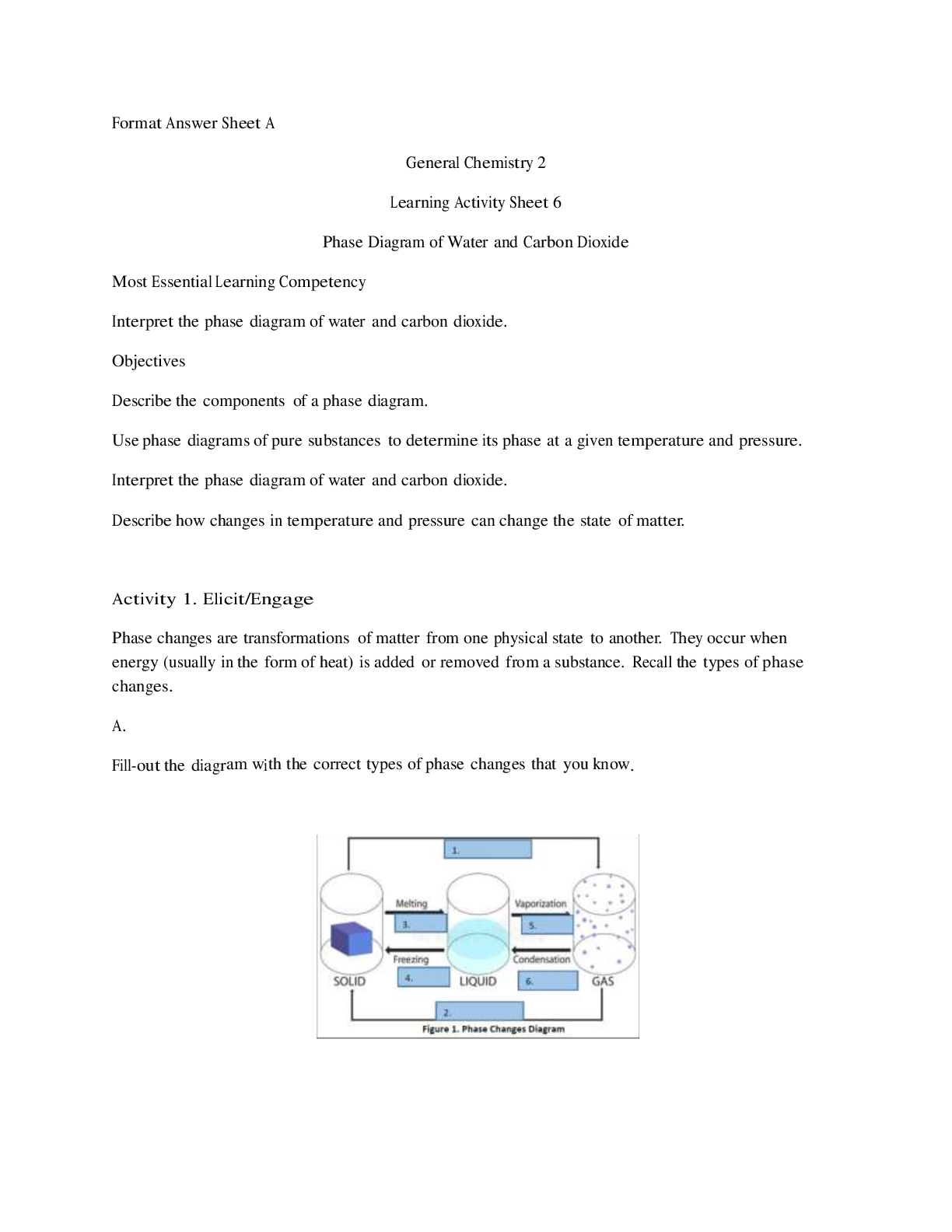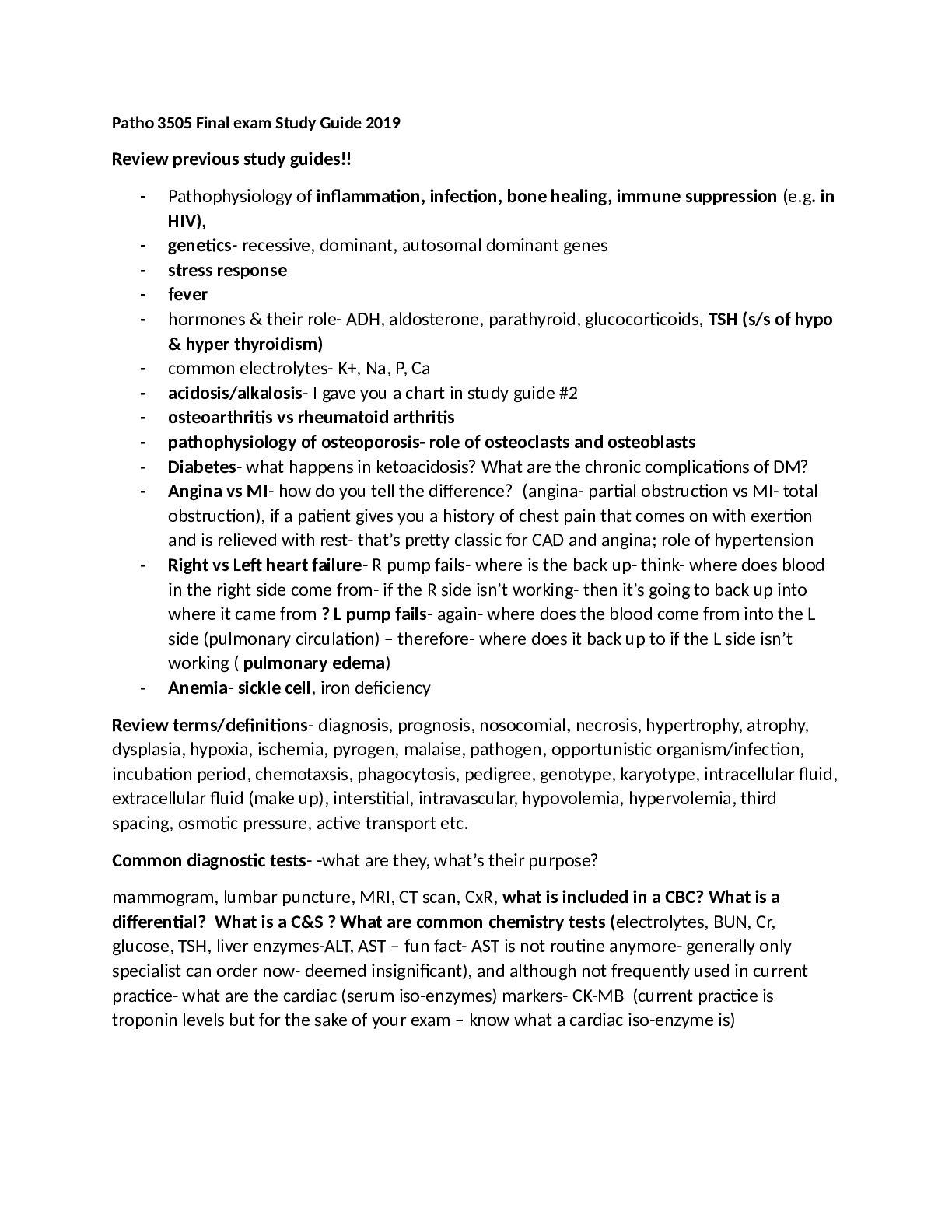*NURSING > STUDY GUIDE > Role & Scope Exam 3 Study Guide (NUR 2868) (All)
Role & Scope Exam 3 Study Guide (NUR 2868)
Document Content and Description Below
Role & Scope Exam 3 Study Guide (NUR 2868) Modul e 07 - Interdiscipl inar y Col labo rat ion "Alone we can do so little; together we can do so much." Teamwork Happens Daily The above quot... e comes from Helen Keller (Lash, 1980). Nurses can certainly attest to this fact, for without teamwork and collaboration between departments, patient care would be severely jeopardized. Nurses work in teams every day. Nursing care on the hospital floor is supported by nurse's aides, LPNs, RNs, who all must work together to get the daily care accomplished. But there is often more care necessary than the nurse can provide: Respiratory, Dietary, Physical Therapy, etc. Who, then, assesses the need for and coordinates these care issues? The provider may or may not have prescribed collaborative care but it often falls upon the nurse to further assess and suggest the inclusion of interdisciplinary care. Effective interdisciplinary teams require collaboration, which is often led by the nurse, who needs to avoid an authoritarian approach. If team members work in an authoritarian environment, they may be hesitant to make decisions for themselves and may fully depend upon the authoritarian leader. Creativity will be dampened, and creativity is mandatory for team progress. Categories of Collaborative Care Collaborative care falls into several categories: 1. Nurse to Patient Collaboration. Nurses coordinate with patients the many issues surrounding health promotion and disease prevention, treatment methods, lifestyle changes, and end-of-life decisions. Even Florence Nightingale taught collaboration with the patient, assessing what is needed or wanted. 2. Nurse-Nurse Collaboration (Intraprofessional). Nurses work in teams in hospitals, in clinics, and in communities that provide collaboration and support in patient caregiving. Nurses from various units, fields, and with different experiences also collaborate: nurse managers, nurse researchers, nurse educators, advanced practice nurses, as well as novice nurses with expert nurses! Mentoring is one example of this collaboration. Shift "hand-offs" are also exemplars. 3. Interprofessional Collaboration. This is the category that often comes to mind when thinking about collaborative care. Nurses form partnership between a team of health providers from medicine, pharmacy, occupational therapy, physical therapy, dentistry, social work, education, and even law. The ANA code of ethics and QSEN both address interprofessional collaboration as an important part of nursing care. 4. Interorganizational collaboration. Nurses must be aware of and utilize resources and information between organizations which will benefit patients at the local, national, or global levels. Examples of this are Hospice Care at the local level, and Health Care Consortiums at the national level. Nurses Are at the Forefront of this Collaboration So why are nurses at the forefront of this care system? What makes them uniquely qualified to address this important piece of patient care? The nurse typically knows the patient's needs best, having assessed them at the beginning of their relationship. They have a holistic understanding of the patient and his health care wishes. Having access to post-discharge resources, nurses often coordinate suggested plans of care. Nurses own the attributes of professionalism, ethical behavior, and communication skills necessary to accomplish all the goals. They also should have an understanding of, and access to, the resources needed to formulate a partnership between patient, nurse, and the member of the incoming team. Consider the following case: You have worked on the medical surgical floor for ten months and have noticed the same patient returning many times with the same problem: uncontrolled diabetes. You don't feel as though the client understands the nature of, or the treatment for, the condition. You share this observation with your nurse-manager who requests that "someone" assemble a team to look closer at this problem. You have volunteered to be a member of the team. Who will you invite? A pharmacist? A diabetic educator? A nutritionist? Why were these people selected for your team? Now think about the information these people will report back to you. What will you do with this information? (Hint: remember the Nursing Process!) Develop a plan of care with your patient, of course! You, the nurse, are uniquely qualified to disseminate this information into a working care plan for your patient to achieve optimal health. This means you must understand the various roles and backgrounds of each discipline with which you work. At the same time, you may be leading teams of different disciplines of nursing. Here again, it is critical to understand everyone's role and job description. In addition, the collaboration needed in interdisciplinary teams cannot be created without mutual trust and respect among the members. We each have a job to do. Nurses need to remember this when assembling interdisciplinary care teams; no one job is more important than another when we are all working together for patient care! Effective teams participate in effective problem solving, increased creativity, and safe and improved health care (Yoder- Wise, 2011). In effective teams, members are required to work together in a respectful, civil manner. They must all be committed to providing input that generates in a positive outcome for the patient. In later modules, we will explore what happens when teams do not work well together, but for now, realize the nurse's potential in bringing about all of the key players needed to address the needs of the patient. Modul e 08 - Comm unicat ion Listening It has been said that Listening is the greatest tool to good Communicating. What does that mean to you as a nurse? Well, to be a good listener, a nurse needs to show attentiveness through eye contact and body language. Active listening means postponing judgment about what is being said and listening to all that is said (and not just the first or last words). It is motivated by a genuine desire to learn about the other person. These skills give the speaker some feedback-non-verbal communication - to indicate that what is being said is understood. Verbal and Nonverbal Skills Verbal and nonverbal skills are mandatory personal communication strategies; the ability to assess these messages is also critical (Yoder-Wise, 2011). Many of the messages we communicate to others are nonverbal, and when nonverbal and verbal messages are in conflict, the nonverbal message is regarded as the most powerful. Professional nurses are constantly required to communicate patient information to other members of the nursing team. The SBAR (Situation, Background, Assessment, and Recommendation) system was developed by professionals ....................................................................CONTINUED.......................................................... [Show More]
Last updated: 2 years ago
Preview 1 out of 10 pages

Buy this document to get the full access instantly
Instant Download Access after purchase
Buy NowInstant download
We Accept:

Reviews( 0 )
$10.00
Can't find what you want? Try our AI powered Search
Document information
Connected school, study & course
About the document
Uploaded On
Mar 20, 2021
Number of pages
10
Written in
Additional information
This document has been written for:
Uploaded
Mar 20, 2021
Downloads
0
Views
61



.png)











